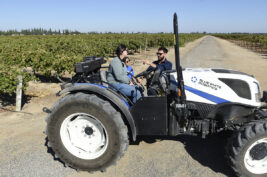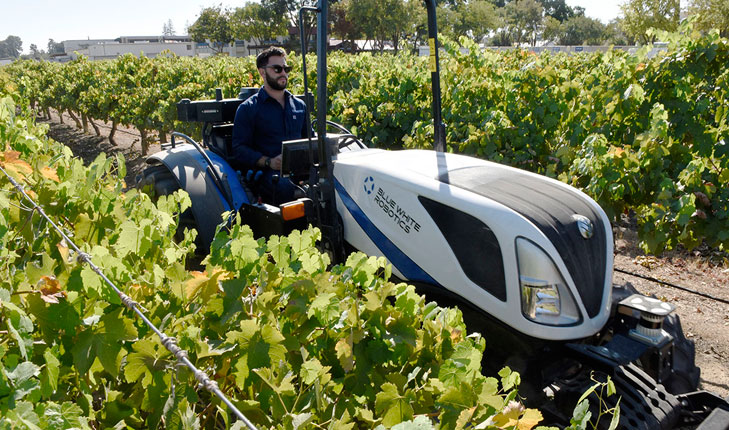Growing up near Tel Aviv, Israel, Fresno State mechanical engineering sophomore Yanir Ariav was introduced to agriculture as a teenager by working in a nearby olive orchard and horticultural nursery.
Each of the operations were relatively small, which meant limited large farm equipment and a reliance on physical labor — a practice shared by many Central Valley farmers.

Mechanical engineering student Yanir Ariav demonstrates ag robotics technology to campus vineyard manager Leah Groves and student Ashley Cardova.
Ariav’s added background in computer programming has led him back to agriculture through a career that started in 2018 with Blue White Robotics. Since then, he has worked in managerial roles for the agricultural robotics company’s international headquarters in Tel Aviv, as well as in Brazil and now Fresno.
The past two years at its U.S. headquarters, he has helped dozens of Central Valley growers retrofit their tractors and other machinery to operate autonomously. The technology gathers additional tracking data for technology like sprayers to reduce costs while increasing equipment efficiency.
“Farming isn’t an easy profession since your costs and profit margins are always changing,” Ariav said. “Advances in computer-assisted technology can help farms overcome labor shortages to run closer to capacity, especially at key parts of the year (like harvest) when timing is critical. As the industry grows forward, the ideal autonomous farm of the future can work 24 hours a day and use technology to tackle issues more resiliently and sustainably.”
Growers can reap expanded benefits and save money in other ways. Fewer manually driven tractors means reduced labor and gas costs, smaller carbon footprints and related tax expenses, and improved air quality. The company’s technology and its network of sensors can also track the maintenance needs of the tractor. Sensor data from sprayer applications can be integrated with GPS-collected harvest data to help future planning to increase yields.
A sneak peek into the future of agricultural technology like this and from around the world will be showcased Tuesday to Thursday, October 18 to 20 at the FIRA USA 2022 conference, which will be hosted for the first time in the United States in Fresno.
The Fresno Convention Center and Event Center (848 M Street) will host the first two days aimed at growers, technology manufacturers and professionals from the academic, investing and entrepreneurial areas.
The opening day will feature research and development presentations by technologists, scientists and academics. The second day of the event will feature a business expo, panel discussions, breakout sessions and networking opportunities.
Conference attendees can then see equipment from 14 technology sponsors like Blue White Robotics from 8:45 a.m. to 2:45 p.m. Oct. 20 at demonstrations at the University Agricultural Laboratory at Fresno State. This portion of the conference is being coordinated by the campus Center for Irrigation Technology and will feature planting, cultivating, harvesting, spraying, mowing and other tasks in the campus vineyard and row crops fields.
A similar conference organized by GOFAR, a French ag robotics trade association, has been held annually in Toulouse, France since 2016 for vegetable and specialized crop growers.
The international organizers started planning this event in spring 2021 with the University of California Agriculture and Natural Resources, Western Growers and the Fresno-Merced Future of Food (F3) Innovation coalition.
Walt Duflock, vice president of innovation for event co-sponsor Western Growers, is working to advance the pace of innovation in this sector through the Global Harvest Automation Initiative, which will be presented at the event.
One of the initiative’s goals is to automate 50% of specialty crop harvest in the next 10 years.
“We wanted to bring the FIRA event here because the U.S. market for specialty crop ag tech startups is so strong in the San Joaquin Valley,” Duflock said. “FIRA USA can connect the entire specialty crop community – educators, commercialization folks, startup companies and large and small growers — and puts the entire event focus on specialty crop automation for three days.”
The conference’s emphasis is equally aligned with Ariav’s career and academic directions.
“The Central Valley is one of the world’s leading agricultural areas because it has such an array of commodities and growers,” Ariav said. “I am fortunate to be part of a company (Blue White Robotics), university, industry and community all committed to innovation. This relationship has led me to a deeper love of agriculture and to better serve the industry and my clients’ needs. Expanding on my engineering background with classes like agronomy and irrigation can help me better apply our technology to feed the growing world population more sustainably.”
To learn more about this upcoming event, visit www.fira-agtech.com/event/fira-usa.





